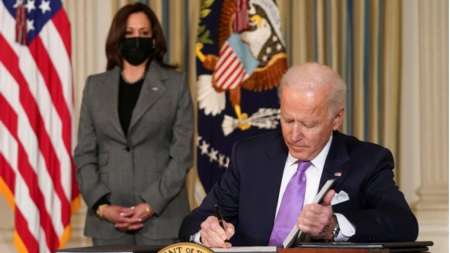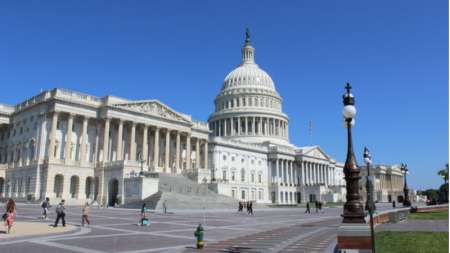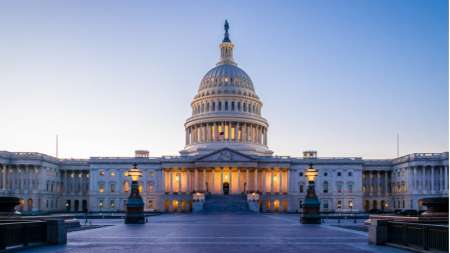The United States Cyber Command (CYBERCOM) is responsible for the nation’s joint cyber warfighting architecture, and its executive director said this week that additional budget authorities extended to the command under the fiscal year (FY) 2022 National Defense Authorization Act (NDAA) will allow for more aligned joint training and advanced training of cyber operators, according to the CYBERCOM Executive Director. […]
President Biden signed the fiscal year (FY) 2022 omnibus appropriations bill today that will keep the Federal government funded through Sept. 30. […]
After a surprising failure to get mandatory cyber incident reporting included in the fiscal year (FY) 2022 National Defense Authorization Act (NDAA), Rep. Yvette Clarke, D-N.Y., and John Katko, R-N.Y., called the issue a top cybersecurity legislative priority for 2022. […]
Sen. Gary Peters, D-Mich., is renewing calls for mandatory incident reporting legislation, after meeting virtually with Biden administration cybersecurity leaders on Jan. 5 for a briefing about the Log4j critical vulnerability. […]
The Senate passed the conferenced version of the fiscal year (FY) 2022 National Defense Authorization Act (NDAA) today, sending the $768 billion defense spending bill to President Biden’s desk for his signature. The annual defense spending bill has now been passed 61 years in a row. […]
The Senate on Dec. 14 voted to invoke cloture on the conferenced version of the fiscal year (FY) 2022 National Defense Authorization Act (NDAA), setting up a final vote on Wednesday for the $768 billion defense spending bill. […]
While a good bit of the focus on the conferenced version of the fiscal year (FY) 2022 National Defense Authorization Act has centered around the lack of incident reporting and other legislative items that were cut from the bill, the defense spending bill that passed the House of Representatives last week continues to retain a variety of important cybersecurity and tech-related provisions. […]
After a spate of cyberattacks and ransomware attacks on American companies and critical infrastructure providers since the start of the COVID-19 pandemic, lawmakers and members of the cybersecurity industry expressed shock and disappointment that mandatory cyber incident reporting was dropped from the conferenced version of the fiscal year (FY) 2022 National Defense Authorization Act (NDAA). […]
Two major pieces of cybersecurity legislation – a Senate-approved bill to reform the Federal Information Security Management Act (FISMA), and another bill to standardize reporting requirements for major cybersecurity incidents – both failed to make the cut in the House-Senate conference version of the fiscal year (FY) 2022 National Defense Authorization Act (NDAA) that passed the House Dec. 7. […]
Senate Majority Leader Chuck Schumer, D-N.Y., expects to have a final conference agreement for the fiscal year (FY) 2022 National Defense Authorization Act (NDAA) this week, with votes potentially taking place into the weekend, Schumer wrote in a Dec. 6 Dear Colleague letter. […]
After returning from the Thanksgiving break yesterday, the Senate’s progress on consideration of the fiscal year (FY) 2022 National Defense Authorization Act (NDAA) stalled last night with Senate Republicans refusing to vote for cloture due to disagreements on the amendment process for the defense spending act. […]
The Senate returned to work Monday afternoon to continue consideration of the fiscal year (FY) 2022 National Defense Authorization Act (NDAA), beginning a torrid stretch of legislative work leading up to the end of the calendar year. […]
As the Senate returns to work on Nov. 29 with the completion of debate on the Fiscal Year (FY) 2022 National Defense Authorization Act (NDAA) at the top of its agenda, lawmakers will be looking to tack on a host of cybersecurity-related amendments to the defense spending bill. […]
After a potential setback late last week, Sens. Gary Peters, D-Mich., and Rob Portman, R-Ohio, are still looking to attach their legislation to reform the Federal Information Security Modernization Act (FISMA) added to the Senate’s fiscal year (FY) 2022 National Defense Authorization Act (NDAA) making its way through the chamber, a Senate Homeland Security and Governmental Affairs Committee staffer told MeriTalk. […]
Senator Kirsten Gillibrand, D-N.Y., has introduced an amendment (SA. 4281) to the Fiscal Year 2022 National Defense Authorization Act (NDAA) that would fundamentally transform the Federal government’s approach to unidentified aerial phenomena (UAP) – more commonly referred to as unidentified flying objects (UFOs). […]
Despite the previous wish to pass the fiscal year (FY) 2022 National Defense Authorization Act (NDAA) before going on Thanksgiving break, the Senate has adjourned until Nov. 29, when it will again take up the defense spending bill, according to a Senate source. […]
The House of Representatives passed the Build Back Better (BBB) Act this morning, sending the more than $1.75 trillion reconciliation package to the Senate. The bill includes billions for supply chain resiliency, as well as additional cybersecurity and IT modernization funding. […]
Democratic leaders in both chambers of Congress announced Nov. 17 that they will form a conference committee to resolve differences between the Senate-passed United States Innovation and Competition Act (USICA) and the House-passed National Science Foundation (NSF) for the Future Act – thus creating a pathway to passage for the supply chain and research investment bills. […]
With the House consideration of the Build Back Better Act (BBBA) – Democrats’ $1.75 trillion-plus budget reconciliation bill – pushed to this week, Senate Majority Leader Chuck Schumer, D-N.Y., said that the Senate will begin consideration of the fiscal year (FY) 2022 National Defense Authorization Act (NDAA) this week. […]
Sponsors of two major pieces of legislation that would make formative changes to the way that private sector companies report cyberattacks to the government – and how Federal government agencies conduct their own cyber defenses – are hitching their hopes for passage to annual defense spending legislation that traditionally gets strong bipartisan support from lawmakers. […]
The Senate Homeland Security and Government Affairs Committee voted today to approve the Cyber Incident Reporting Act, which would require critical infrastructure operators to report cyberattacks to the Federal government, and require most government and business entities to report to the government if they make a ransomware payment. […]
The fiscal year (FY) 2022 National Defense Authorization Act (NDAA) passed the House of Representatives late Sept. 23 with a bipartisan 316-113 vote. Among the amendments are a number of tech provisions focusing heavily on cybersecurity, along with some focusing on the digital workforce, cloud, and AI. […]
The fiscal year (FY) 2022 National Defense Authorization Act (NDAA) will be brought to the House floor for continued consideration and an eventual vote this afternoon, according to Majority Speaker Steny Hoyer, D-Md. A lesser-known provision of the bill would create a new office at the Department of Defense (DoD) dedicated to studying unidentified aerial phenomena (UAP). […]
After a two-day meeting that included deciding which amendments to the fiscal year (FY) 2022 National Defense Authorization Act (NDAA) will receive votes, the House Rules Committee ruled several cybersecurity provisions to see floor votes when the measure comes up. […]
The American Federation of Government Employees (AFGE) now supports Rep. Jimmy Panetta’s, D-Ca., National Defense Authorization Act (NDAA) amendment that would create a Civilian Cyber Reserve at the Department of Homeland Security (DHS), AFGE announced in a follow-up letter on Sept. 18. […]
The American Federation of Government Employees (AFGE) wrote the leaders of the House Rules Committee Sept. 15 to express their opposition to amendments to the fiscal year (FY) 2022 National Defense Authorization Act (NDAA) that would create a civilian cyber reserve program. […]
With fiscal year (FY) 2021 ending September 30, the House Rules Committee will be meeting on September 20 to decide which of the over 800 amendments filed for the FY2022 National Defense Authorization Act (NDAA) will get a floor vote. […]
The House Armed Services Committee passed the fiscal year 2022 (FY2022) National Defense Authorization Act (NDAA) on Sept. 1 by a bipartisan vote of 57-2. The bill will now move to the full chamber for consideration. […]
The House Armed Services Committee’s Subcommittee on Cyber, Innovative Technologies, and Information Systems approved the subcommittee’s markup of the Fiscal Year (FY) 2022 National Defense Authorization Act (NDAA) on July 28, and the bill will now move to the full committee for consideration. […]
A group of House lawmakers that has been studying Defense Department (DoD) supply chain concerns has given the Pentagon a list of high-level recommendations to address supply chain risks going forward. […]
























